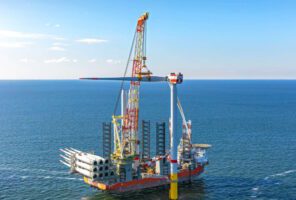Australia’s corporate watchdog has launched federal court action against battery start-up Magnis Energy Technologies and its executive director Frank Poullas, alleging failure to disclose the “parlous state” of the company’s battery gigafactory plans.
ASX-listed Magnis built a profile around the promise of electric vehicle batteries that would be able to recharge by up to 85 per cent in just six minutes, using battery cells it would manufacture at a gigawatt-scale in Australia and the US.
In Australia, the plan was to build a $3 billion, 1.8GWh lithium-ion battery manufacturing plant in Townsville in Queensland. A feasibility study was completed in 2019, supported by a $3.1 million funding grant from the Queensland government, and NAB was appointed as a financial advisor.
By 2021, though, Magnis had all but abandoned the Townsville plans and turned its focus to the US gigafactory proposed for New York, as well as to a graphite project in Tanzania.
In a statement on Tuesday, the Australian Securities & Investments Commission (ASIC) said its case concerns the New York factory – Magnis’ “self-described flagship project,” operated by US company Imperium3 New York (iM3NY), in which Magnis holds a majority stake.
ASIC alleges Magnis became aware claims it had made about the plant’s funding, automation and ability to produce cells at a rate of 1GWh a year were incorrect and that it, and Poullas, breached continuous disclosure laws by not informing the market of this in a timely manner.
The watchdog notes Magnis issued multiple ASX announcements between 19 April 2021 and 31 March 2023, saying that the battery plant was fully-funded to generate at least 1 GWh of lithium-ion battery cells per year – claims that were repeated to media.
Magnis also made multiple announcements suggesting its flagship project had commenced commercial production and would achieve fully-automated production in 2022, moving to 1GWh by the end of 2023 and then to “double-digit gigawatts” by the end of the decade.
But ASIC alleges that, in reality, Magnis and Poullas were aware in January 2023 that these claims and predictions were inaccurate, and the plant was struggling to produce 300 battery cells per day.
ASIC further alleges that by April 2023 they were aware that the battery plant could not manufacture saleable, defect-free battery cells at scale or generate any more than nominal revenue from sales. In failing to disclose this, ASIC alleges Magnis and Poullas engaged in “misleading or deceptive” conduct.
“Continuous disclosure obligations are critical to the fair and efficient functioning of Australia’s financial markets and directors must ensure their companies comply with the continuous disclosure regime,” ASIC chair Joe Longo said in a statement.
“In this case, we allege that Magnis and its executive chairman, Frank Poullas, failed on both counts, leaving the market materially uninformed and investors unaware that Magnis’s battery factory was in a parlous state, both financially and operationally.”
As RenewEconomy reported, Magnis went into a temporary trading halt in November of 2021 after reports emerged in the media that Poullas was under investigation by ASIC.
At the time, the company insisted in statement issued via the ASX that it this was not the case and questioned the media report’s “unsubstantiated” claims.
In an ASX shareholder update issued on Tuesday, Magnis confirmed that it was being sued by ASIC and said it would “examine
the statement of claim in conjunction with its legal advisers and will keep the market informed as required.”








